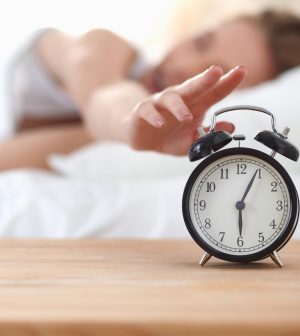- 8 Ways to Increase Dopamine Naturally
- 7 Best Breads for Maintaining Stable Blood Sugar
- Gelatin vs. Collagen: Which is Best for Skin, Nails, and Joints?
- The Long-Term Effects of Daily Turmeric Supplements on Liver Health
- Could Your Grocery Store Meat Be Causing Recurring UTIs?
- Are You Making This Expensive Thermostat Error This Winter?
- Recognizing the Signs of Hypothyroidism
- 10 Strategies to Overcome Insomnia
- Could Artificial Sweeteners Be Aging the Brain Faster?
- Techniques for Soothing Your Nervous System
Transgender Youth Much More Likely to Have Troubled Sleep

Transgender youth are more likely than others to experience sleep disorders such as insomnia and sleep apnea, and researchers now recommend these young people be screened for sleep problems.
“Transgender and gender-nonconforming identity may precede mental health disorders, and both influence insomnia diagnosis,” said study co-author Galit Levi Dunietz, an epidemiologist in the University of Michigan neurology department’s division of sleep medicine.
For the study, the researchers analyzed claims data from more than 1.2 million people aged 12 to 25. Among them were just over 2,600 young people who identified as transgender or gender-nonconforming.
The investigators found that transgender youth were 5.4 times more likely than cisgender youth to have insomnia. They were also three times more likely to have sleep apnea or other sleep disorders. (Cisgender means they identify with the gender assigned at birth).
The results show a concerning number of individuals with disorders that harm sleep quality, said co-author Dr. Ronald Gavidia, a sleep medicine physician at the university.
Other research has suggested that transgender youth and adults also have a high prevalence of depression and anxiety symptoms. These are known to affect sleep quality and health, and they may be contributing to insomnia in this group, the study authors noted.
“Given this higher prevalence of sleep disorders in relation to cisgender youth, clinicians should consider screening and testing this population for such disorders,” Gavidia said.
Among the transgender youth in the study, more than half had pursued gender-affirming therapy. Those who did were half as likely to have sleep disorders as those who had not received this treatment.
The authors said the findings suggested that having gender-affirming therapy could protect against worsening sleep health caused by psychological stressors from prejudice and discrimination.
“As mood disorders and insomnia have a bidirectional relationship, gender transition through affirming therapies could improve mental health, which, in turn, may decrease the proportion of insomnia by improving gender dysphoria, poor mood and minority stress,” Gavidia said.
The researchers suggested future studies should evaluate sleep disorders before and after gender-affirming therapy.
The findings were published online recently in the Journal of Clinical Sleep Medicine.
More information
The U.S. Centers for Disease Control and Prevention has more on sleep disorders.
SOURCE: Michigan Medicine – University of Michigan, news release, Nov. 21, 2022
Source: HealthDay
Copyright © 2026 HealthDay. All rights reserved.










